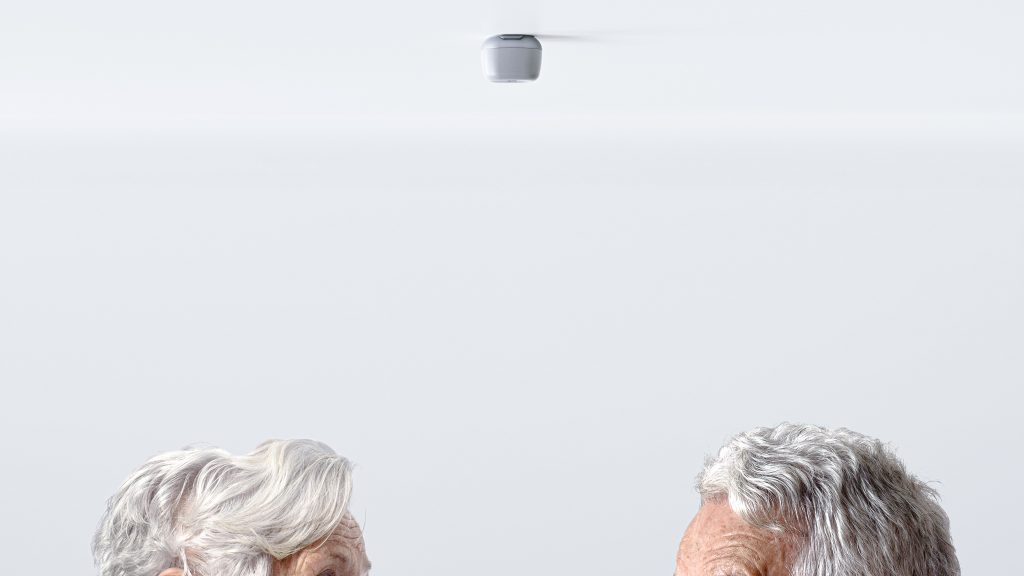Investigators:
Amanda Paluch, UMass Amherst
Dae Hyun Kim, Hebrew SeniorLife
Rags Gupta, Butlr Technologies Inc
MassAITC Cohort: Year 1 (Aging)

Project Accomplishments: This AITC pilot project explored the use of non-invasive, ceiling-mounted heat sensors to detect frailty in older adults living in senior communities. The study involved 44 participants and compared data from these heat sensors with wearable devices and clinical assessments to evaluate movement patterns like gait speed and walking distance. While the heat sensors showed promise in capturing relevant movement data, their results did not strongly correlate with wearable sensor data due to technical and contextual differences. Despite these challenges, the team developed early models to predict frailty and found that most participants—especially those already frail—were comfortable using the sensors in their homes.
The project highlighted both the potential and limitations of using ambient sensing technologies in healthcare. It emphasized the importance of refining sensor placement, improving data alignment across devices, and tailoring algorithms to specific environments. The study also underscored the need for careful deployment and user education to ensure acceptance and effectiveness. Overall, the findings support further development of heat sensor-based monitoring as a complementary tool to wearable devices, with the goal of enabling more accessible and equitable health monitoring for aging populations.
Initial Proposal Abstract: Aging is characterized by a decrease in physical and mental capacity, increasing the risk of chronic diseases or mortality. The clinical display of aging may be subtle at first, such as decrease in physical activity and slowing of gait, until it manifests as frailty at a later stage. Frailty affects 10% of community-dwelling older adults, with up to 25% of those 80 years or older. To prevent and slow progression of frailty, early detection is key, which can be achieved by measuring key movement features of frailty such as gait speed, walking distance, and time spent physically active and sedentary.
This project will develop a contactless in-home assessment tool for frailty using body heat sensing technology. The ceiling or wall-mounted heat sensors, developed by butlr, will measure real-time movement of free-living people without jeopardizing privacy. The spatial intelligence technology of butlr can be used for early identification of changes in movement patterns, and in turn monitoring frailty.
We will enroll 60 older adults with various levels of frailty and install heat sensors in their homes. We will develop heat sensor-based algorithms for key movement features of frailty against in-clinic frailty assessment and free-living wearable sensor-based features of frailty as gold standards. Additionally, we will evaluate acceptability of using these heat sensors in homes of older adults. Once validated, early detection and monitoring of frailty become possible in older adults’ home environment, which could eventually lead to interventions to reduce the burden of frailty and promote healthy aging.
Outcomes:
- Award: Jiani Zeng, co-founder and CPO of Butlr wins 2025 McKnight’s Women of Distinction award in the Commercial Excellence category
 The technology designed by Zeng has been key in improving senior living and care operations, helping staff members effectively monitor residents through motion detection, enabling them to respond quickly to acute health risks without compromising resident privacy. Forster Stubbs, McKnight Senior Living The work of Jiani Zeng, a Chinese designer,… Read more: Award: Jiani Zeng, co-founder and CPO of Butlr wins 2025 McKnight’s Women of Distinction award in the Commercial Excellence category
The technology designed by Zeng has been key in improving senior living and care operations, helping staff members effectively monitor residents through motion detection, enabling them to respond quickly to acute health risks without compromising resident privacy. Forster Stubbs, McKnight Senior Living The work of Jiani Zeng, a Chinese designer,… Read more: Award: Jiani Zeng, co-founder and CPO of Butlr wins 2025 McKnight’s Women of Distinction award in the Commercial Excellence category - Award: Gold Winner at McKnight’s Tech Awards in Falls Prevention, Management or Detection Category
 The Gold went to Butlr and Ranagard Community for “Butlr: AI for earlier intervention.” By passively monitoring movement patterns via thermal sensors, Butlr Care alerts staff members when residents need assistance. The sensors detect movement but are purposely designed to be unable to capture any personally identifiable information. At Ranagard… Read more: Award: Gold Winner at McKnight’s Tech Awards in Falls Prevention, Management or Detection Category
The Gold went to Butlr and Ranagard Community for “Butlr: AI for earlier intervention.” By passively monitoring movement patterns via thermal sensors, Butlr Care alerts staff members when residents need assistance. The sensors detect movement but are purposely designed to be unable to capture any personally identifiable information. At Ranagard… Read more: Award: Gold Winner at McKnight’s Tech Awards in Falls Prevention, Management or Detection Category - Funding: $38 million in Series B funding secured with an emphasis on growth in the senior living community sector
 “Our focus for this strategic funding is to continue to support enterprise customers and meet the strong demand for our technology in senior care.” Honghao Deng, CEO and co-founder, Butlr Burlingame, Calif. – August 26, 2024 – Butlr, a physical AI (PAI) startup, today announced $38M in Series B funding to… Read more: Funding: $38 million in Series B funding secured with an emphasis on growth in the senior living community sector
“Our focus for this strategic funding is to continue to support enterprise customers and meet the strong demand for our technology in senior care.” Honghao Deng, CEO and co-founder, Butlr Burlingame, Calif. – August 26, 2024 – Butlr, a physical AI (PAI) startup, today announced $38M in Series B funding to… Read more: Funding: $38 million in Series B funding secured with an emphasis on growth in the senior living community sector - New Product Launch: Butlr Technologies introduces “Butlr Care” – with the goal of ambient monitoring for senior living and home care.
 [Burlingame, CA–November 6, 2023] – Butlr, a leading provider of anonymous people-sensing technology, today announced the availability of Butlr Care. The solution offers a new option for senior living communities to improve safety and care while protecting privacy and simplifying daily life for residents and staff. By passively monitoring movement… Read more: New Product Launch: Butlr Technologies introduces “Butlr Care” – with the goal of ambient monitoring for senior living and home care.
[Burlingame, CA–November 6, 2023] – Butlr, a leading provider of anonymous people-sensing technology, today announced the availability of Butlr Care. The solution offers a new option for senior living communities to improve safety and care while protecting privacy and simplifying daily life for residents and staff. By passively monitoring movement… Read more: New Product Launch: Butlr Technologies introduces “Butlr Care” – with the goal of ambient monitoring for senior living and home care.
